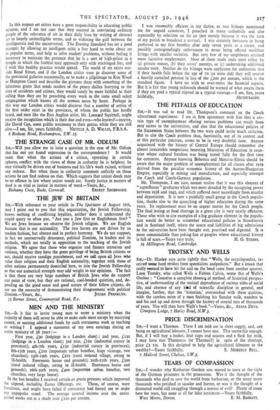THE PITFALLS OF EDUCATION
Sia,—It was sad to read Mr. Thompson's comment on the Czech educational experiment. I am in firm agreement with him that a cer- tain type of unemployment offering serious problems can result from easy access to the universities, and also that the educational policies of the Succession States between the two wars could invite much criticism. But to cite. the Czech problem thus, facetiously, out of its context and at this particular juncture, seems to be in very doubtful taste. Anyone acquainted with the history of Central Europe should remember the almost irresistable temptations besetting Ministries of Education in coun- tries where cultural freedom was being tasted fully for the first time for centuries. Anyone knowing Bohemia and Moravia-Silesia should be aware that the major problem of unemployment for all classes after 1919 derived from the peculiar economic history of the Austro-Hungarian Empire, especially in mining and manufacture, and especially amongst the Czech and Czech-German population.
Mr. Thompson, I am sure, cannot realise that it was this element of " superfluous " graduates which was most dreaded by the occupying power between 1938 and 1945, and which suffered most accordingly from murder and deportation. It is now a painfully small group in the Czech popula- tion, thanks also to the quenching of higher education during the same years. Its replacement must be an urgent matter for the Czech people. The final jesting at food shortage in a great city is very nearly offensive. Those who wish to cite examples of a big graduate element in the popula- tion would do better to remember educational policies in Scandinavia and in Scotland itself, where the assets and liabilities of big admissions to the universities have been thought out, practised and digested. It is more commendable than poking fun at peoples whose educational history


























 Previous page
Previous page